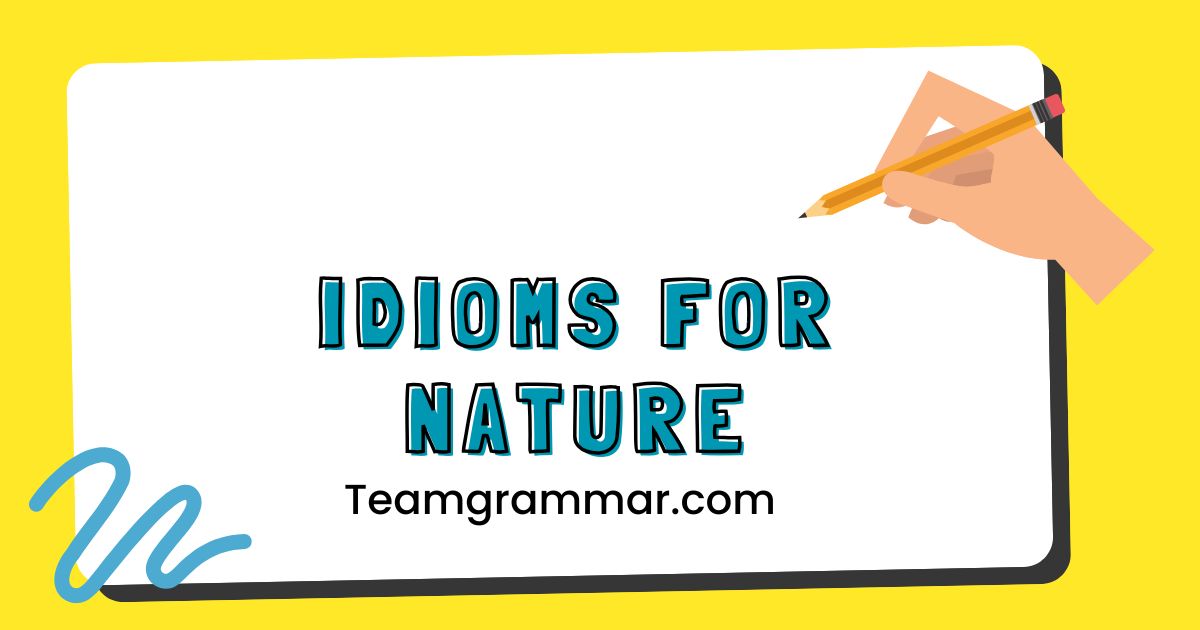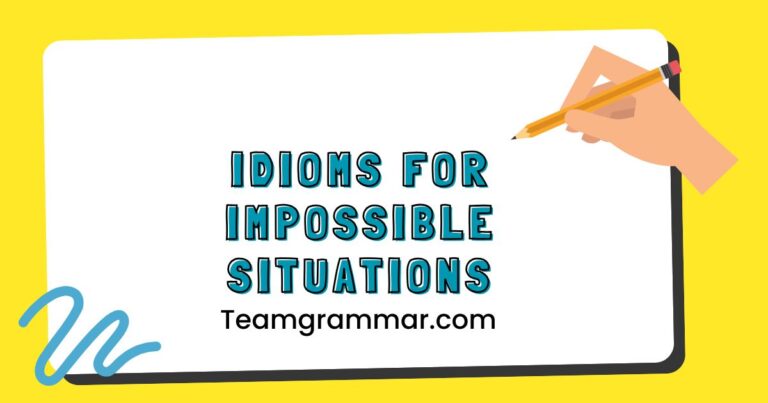49 Nature Idioms: Mastering Figurative Language in English
Idioms enrich the English language, adding color and depth to our communication. Understanding idioms, especially those related to nature, is crucial for both native and non-native speakers.
These expressions often carry cultural nuances and can significantly enhance comprehension and fluency. This article provides a comprehensive guide to nature idioms, exploring their definitions, structures, usage, and common pitfalls.
Whether you’re an English language learner, a teacher, or simply someone who loves language, this guide will equip you with the knowledge and skills to master nature-related idioms and use them effectively in your everyday communication. By understanding these idioms, you’ll not only improve your English proficiency but also gain a deeper appreciation for the beauty and expressiveness of the language.
This guide is designed for English language learners, teachers, and anyone interested in expanding their knowledge of English idioms. It covers a wide range of nature-related idioms, providing clear definitions, examples, and practice exercises to help you master their usage.
Table of Contents
- Definition of Idioms
- Structural Breakdown of Idioms
- Types and Categories of Nature Idioms
- Examples of Nature Idioms
- Usage Rules for Nature Idioms
- Common Mistakes with Nature Idioms
- Practice Exercises
- Advanced Topics in Nature Idioms
- Frequently Asked Questions
- Conclusion
Definition of Idioms
Anidiomis a phrase or expression whose meaning cannot be understood from the ordinary meanings of the words it contains. In other words, idioms are figurative expressions where the overall meaning differs from the literal meaning of the individual words.
Idioms are deeply embedded in the cultural and linguistic fabric of a language, and mastering them is essential for achieving fluency and understanding nuanced communication.
Idioms can be classified based on their structure, origin, or thematic content. Nature idioms, specifically, are idioms that draw their imagery and metaphors from the natural world.
These idioms often reflect our relationship with nature and the ways in which we perceive and interact with it. Understanding the context and cultural background of an idiom is crucial for interpreting its intended meaning.
The function of idioms in language is multifaceted. They add color, expressiveness, and cultural depth to communication.
Idioms can also serve as a form of linguistic shorthand, conveying complex ideas or emotions in a concise and memorable way. Moreover, idioms contribute to the informal and conversational tone of language, making interactions more engaging and relatable.
Structural Breakdown of Idioms
Idioms generally consist of a fixed combination of words that function as a single unit of meaning. These units can range from simple phrases to complex clauses.
The structural elements of idioms often defy standard grammatical rules, which is why they must be learned as whole units rather than analyzed word by word.
The patterns in idioms are not always predictable, but some common structures include:
- Verb + Preposition: Kick the bucket (to die)
- Adjective + Noun: A cold fish (an unemotional person)
- Prepositional Phrase: In the same boat (in the same situation)
- Clauses: When pigs fly (something that will never happen)
The rules governing idiom formation are largely idiomatic themselves, meaning they are specific to each idiom and not governed by general grammatical principles. This is why rote memorization and exposure to a wide range of idioms are essential for mastering their usage.
Furthermore, many idioms have historical or cultural origins that explain their unique structure and meaning. Understanding these origins can aid in memorization and comprehension.
For example, the idiom “raining cats and dogs” is believed to have originated from a time when heavy rainstorms would wash dead animals through the streets of cities.
Types and Categories of Nature Idioms
Nature idioms can be categorized based on the specific elements of nature they reference. This section will explore four main categories: weather idioms, animal idioms, plant idioms, and earth and landscape idioms.
Weather Idioms
Weather idioms use elements of weather, such as rain, sun, wind, and storms, to describe various situations, emotions, or behaviors. These idioms often convey ideas about change, intensity, or emotional states.
For example, “under the weather” means feeling unwell, while “a storm in a teacup” refers to a minor issue that is blown out of proportion.
Animal Idioms
Animal idioms draw on the characteristics and behaviors of animals to describe human traits, actions, or situations. These idioms often rely on stereotypes or common perceptions of animals.
For instance, “as sly as a fox” describes someone who is cunning and deceitful, while “a wolf in sheep’s clothing” refers to someone who appears harmless but is actually dangerous.
Plant Idioms
Plant idioms use references to plants, such as trees, flowers, and seeds, to describe growth, development, or potential. These idioms often convey ideas about nurturing, resilience, or the cycle of life.
For example, “nip it in the bud” means to stop something at an early stage, while “bearing fruit” means producing positive results.
Earth and Landscape Idioms
Earth and landscape idioms use features of the earth, such as mountains, rivers, and soil, to describe stability, challenges, or foundations. These idioms often convey ideas about strength, endurance, or the underlying nature of things.
For example, “down to earth” describes someone who is practical and realistic, while “tip of the iceberg” refers to a small part of a larger, hidden problem.
Examples of Nature Idioms
This section provides extensive examples of nature idioms, organized by category. Each example is accompanied by a definition and a sample sentence to illustrate its usage.
Weather Idioms Examples
The following table provides examples of weather idioms, their meanings, and example sentences. Weather idioms are frequently used to describe moods, situations, and events.
| Idiom | Meaning | Example Sentence |
|---|---|---|
| Under the weather | Feeling unwell | I’m feeling a bit under the weather today, so I’m going to stay home from work. |
| A storm in a teacup | A minor issue blown out of proportion | Their argument about the seating arrangement was just a storm in a teacup. |
| Raining cats and dogs | Raining very heavily | We can’t go outside; it’s raining cats and dogs. |
| Chase rainbows | Pursue unrealistic goals | He’s always chasing rainbows with his get-rich-quick schemes. |
| Every cloud has a silver lining | There is something positive in every bad situation | Even though she lost her job, every cloud has a silver lining; she can now pursue her passion. |
| Fair-weather friend | Someone who is only a friend when things are good | He’s a fair-weather friend; he’s never around when I need help. |
| Get wind of | Hear a rumor or learn about something secret | I got wind of their plans to move to another country. |
| In the doldrums | In a state of inactivity or depression | The project is in the doldrums due to lack of funding. |
| Make hay while the sun shines | Take advantage of a good opportunity | We should make hay while the sun shines and finish the project while we have the resources. |
| On cloud nine | Extremely happy | She was on cloud nine after receiving the acceptance letter. |
| Weather the storm | Survive a difficult situation | The company managed to weather the storm despite the economic downturn. |
| Clear the air | Resolve a conflict or misunderstanding | We need to clear the air and talk about what happened. |
| A ray of sunshine | Someone who brings joy and happiness | Her smile is like a ray of sunshine on a cloudy day. |
| Calm before the storm | A period of peace before a period of turmoil | The calm before the storm is always the most unsettling. |
| Cloud cuckoo land | A state of unrealistic or foolish optimism | He lives in cloud cuckoo land if he thinks he can win the lottery. |
| Face like thunder | To look very angry or upset | He had a face like thunder when he found out about the mistake. |
| Head in the clouds | To be unaware of what is going on around you | She always has her head in the clouds and never pays attention in class. |
| Take a rain check | To postpone a plan | I’m sorry, I can’t make it tonight, but can I take a rain check? |
| Throw caution to the wind | To act recklessly | He decided to throw caution to the wind and quit his job to travel the world. |
| Waiting for a break in the clouds | Waiting for an opportunity | They are waiting for a break in the clouds to launch their new product. |
| In a fog | Confused or disoriented | I was in a fog after waking up from the surgery. |
| Chasing shadows | Wasting time on something unattainable | He’s chasing shadows if he thinks he can find a perfect solution. |
| Sunshine and rainbows | A situation that is idealized and unrealistic | The movie presents a world of sunshine and rainbows, but reality is different. |
| A bolt from the blue | Something sudden and unexpected | The news of his resignation was a bolt from the blue. |
Animal Idioms Examples
The following table provides examples of animal idioms, their meanings, and example sentences. Animal idioms are often used to describe people’s behavior and characteristics.
| Idiom | Meaning | Example Sentence |
|---|---|---|
| As sly as a fox | Cunning and deceitful | He’s as sly as a fox when it comes to business negotiations. |
| A wolf in sheep’s clothing | Someone who appears harmless but is dangerous | Be careful; he’s a wolf in sheep’s clothing. |
| Like a fish out of water | Feeling uncomfortable in a new situation | She felt like a fish out of water at the fancy party. |
| Hold your horses | Wait a moment | Hold your horses! Let’s think about this before making a decision. |
| Let the cat out of the bag | Reveal a secret | He let the cat out of the bag about the surprise party. |
| Kill two birds with one stone | Accomplish two things at once | By shopping on the way home, I can kill two birds with one stone. |
| As busy as a bee | Very busy | She’s as busy as a bee preparing for the conference. |
| Have butterflies in your stomach | Feeling nervous | I have butterflies in my stomach before my presentation. |
| A little bird told me | Someone told me a secret | A little bird told me that you’re getting a promotion. |
| As free as a bird | Completely free | Now that I’ve finished my exams, I feel as free as a bird. |
| Eagle eye | Sharp vision or attention to detail | The accountant has an eagle eye for spotting errors. |
| Cry wolf | Raise a false alarm | He’s cried wolf so many times that no one believes him anymore. |
| Dog days | The hottest days of summer | During the dog days, we like to stay indoors. |
| Eager beaver | Someone who is very enthusiastic and hardworking | She’s an eager beaver and always volunteers for extra tasks. |
| Get your ducks in a row | Organize things properly | We need to get our ducks in a row before the meeting. |
| Guinea pig | A subject for an experiment | I felt like a guinea pig when they tested the new software on me. |
| Happy as a clam | Very happy | He’s happy as a clam now that he’s retired. |
| Like a deer caught in headlights | Surprised and unable to react | She looked like a deer caught in headlights when she was asked the question. |
| More than one way to skin a cat | More than one way to solve a problem | There’s more than one way to skin a cat; let’s try a different approach. |
| Straight from the horse’s mouth | From a reliable source | I heard it straight from the horse’s mouth that the company is merging. |
| The world is your oyster | You have many opportunities | Now that you’ve graduated, the world is your oyster. |
| Wild goose chase | A pointless search | We went on a wild goose chase looking for the rare book. |
| Wouldn’t hurt a fly | Gentle and harmless | She wouldn’t hurt a fly; she’s the kindest person I know. |
| Smell a rat | Suspect something is wrong | I smell a rat; something seems suspicious about his story. |
Plant Idioms Examples
The following table provides examples of plant idioms, their meanings, and example sentences. Plant idioms often describe growth, potential, and development.
| Idiom | Meaning | Example Sentence |
|---|---|---|
| Nip it in the bud | Stop something at an early stage | We need to nip it in the bud before the problem gets worse. |
| Bearing fruit | Producing positive results | Our hard work is finally bearing fruit. |
| Beat around the bush | Avoid getting to the point | Stop beating around the bush and tell me what you really think. |
| Barking up the wrong tree | Accusing the wrong person | You’re barking up the wrong tree; I didn’t take your pen. |
| Take root | To become established | The new ideas are starting to take root in the company. |
| Branch out | Expand your interests or activities | I decided to branch out and try a new hobby. |
| As fresh as a daisy | Energetic and lively | After a good night’s sleep, I feel as fresh as a daisy. |
| Shrinking violet | A shy person | She’s a shrinking violet and doesn’t like to speak in public. |
| Through the grapevine | Through rumors or informal channels | I heard through the grapevine that the company is being sold. |
| Green thumb | Talent for gardening | She has a green thumb and can make any plant grow. |
| Grass is always greener on the other side | Other people’s situations seem better than your own | You always think the grass is always greener on the other side, but that’s not always true. |
| Out of the woods | Out of danger or difficulty | The patient is finally out of the woods after the surgery. |
| Money doesn’t grow on trees | Money is not easily obtained | You need to be careful with your spending; money doesn’t grow on trees. |
| Olive branch | An offer of peace or reconciliation | He extended an olive branch to his former rival. |
| Pushing up daisies | Dead | If I fail this exam, I’ll be pushing up daisies. |
| Stem from | Originate from | His problems stem from his difficult childhood. |
| Turn over a new leaf | Start behaving in a better way | He decided to turn over a new leaf and quit his bad habits. |
| Uproot | Remove from a place | They had to uproot their family when they moved to a new city. |
| Weed out | Remove unwanted elements | We need to weed out the weak candidates from the applicant pool. |
| Planted a seed | Introduced an idea | His speech planted a seed of doubt in my mind. |
| A bed of roses | An easy or pleasant situation | Life is not always a bed of roses; there will be challenges. |
| Thorny issue | A difficult or complex problem | The negotiations were complicated by several thorny issues. |
| Reap what you sow | Face the consequences of your actions | If you work hard, you will reap what you sow. |
| Rooted in | Based on or originating from | His beliefs are rooted in his religious upbringing. |
Earth and Landscape Idioms Examples
The following table provides examples of earth and landscape idioms, their meanings, and example sentences. Earth and landscape idioms often describe stability, challenges, and foundations.
| Idiom | Meaning | Example Sentence |
|---|---|---|
| Down to earth | Practical and realistic | She’s very down to earth and easy to talk to. |
| Tip of the iceberg | A small part of a larger problem | The financial issues we see are just the tip of the iceberg. |
| Rock solid | Very strong and reliable | Their friendship is rock solid. |
| Move heaven and earth | Do everything possible | I’ll move heaven and earth to help you succeed. |
| Salt of the earth | Good, honest people | They are the salt of the earth; always willing to help others. |
| A drop in the ocean | A small amount compared to what’s needed | My contribution is just a drop in the ocean. |
| Hit rock bottom | Reach the lowest point | He hit rock bottom before deciding to seek help. |
| Between a rock and a hard place | In a difficult situation with no good options | I’m between a rock and a hard place; I don’t know what to do. |
| Get over the hump | Pass the most difficult part | Once we get over the hump, the project will be easier. |
| Make waves | Cause trouble or disruption | He likes to make waves and challenge the status quo. |
| Set in stone | Unchangeable | The decision is set in stone and cannot be reversed. |
| Solid ground | A firm basis or foundation | We need to establish some solid ground before proceeding. |
| Test the waters | Try something cautiously | We’re going to test the waters with a small marketing campaign. |
| Underground | Secret or hidden | The information was obtained through underground sources. |
| Walk the earth | Travel widely | He dreams of walking the earth and seeing the world. |
| Zone in | Focus intently | I need to zone in on my work to finish the project. |
| At sea | Confused or uncertain | I’m at sea with these new regulations. |
| Build castles in the air | Make unrealistic plans | She’s always building castles in the air and never follows through. |
| Cover a lot of ground | Discuss many topics | We covered a lot of ground in the meeting. |
| Edge of the earth | A very remote place | They live on the edge of the earth, far from civilization. |
| Go to the ends of the earth | Do anything possible | I would go to the ends of the earth for my family. |
| In deep water | In serious trouble | He’s in deep water after making that mistake. |
| Landslide victory | An overwhelming victory | The candidate won a landslide victory in the election. |
| Off the beaten path | A place that is not well-known or frequently visited | We like to travel to places that are off the beaten path. |
Usage Rules for Nature Idioms
Using nature idioms correctly requires an understanding of their specific meanings and contexts. Here are some general rules to follow:
- Understand the Meaning: Always be sure you know the meaning of the idiom before using it. Misusing an idiom can lead to confusion or miscommunication.
- Consider the Context: Idioms are often informal and may not be appropriate for formal settings. Consider your audience and the overall tone of your communication.
- Use Correctly: Do not alter the wording of an idiom. Idioms are fixed expressions, and changing the words can alter or negate their meaning.
- Be Aware of Cultural Differences: Idioms can vary across cultures and languages. Be mindful of your audience’s background and avoid using idioms that may not be understood or that could be offensive.
Exceptions to these rules are rare, but some idioms may have slight variations depending on regional dialects or personal preferences. However, it’s generally best to stick to the standard form of the idiom to ensure clarity and avoid confusion.
Common Mistakes with Nature Idioms
One of the most common mistakes is interpreting idioms literally. Because idioms have a figurative meaning separate from the literal meanings of their individual words, understanding the intended sense is crucial.
Here are some common mistakes with nature idioms, along with correct examples:
| Incorrect | Correct | Explanation |
|---|---|---|
| “I am exactly like a fish in the water.” | “I feel like a fish out of water.” | The correct idiom is “like a fish out of water,” which means feeling uncomfortable in a new situation. |
| “It is raining dogs and cats today.” | “It’s raining cats and dogs today.” | The correct idiom is “raining cats and dogs,” which means raining heavily. |
| “He is hitting under the bush.” | “He is beating around the bush.” | The correct idiom is “beating around the bush,” which means avoiding getting to the point. |
| “She has a blue thumb.” | “She has a green thumb.” | The correct idiom is “green thumb,” which means having a talent for gardening. |
| “The iceberg’s head.” | “The tip of the iceberg.” | The correct idiom is “tip of the iceberg,” which means a small part of a larger problem. |
| “Hold the horses very tightly.” | “Hold your horses.” | The correct idiom is “hold your horses,” which means wait a moment. |
| “Let the dog out of the bag.” | “Let the cat out of the bag.” | The correct idiom is “let the cat out of the bag,” which means reveal a secret. |
| “As busy as a fox.” | “As busy as a bee.” | The correct idiom is “as busy as a bee,” which means very busy. |
| “I have butterflies in my head.” | “I have butterflies in my stomach.” | The correct idiom is “have butterflies in your stomach,” which means feeling nervous. |
| “A little dog told me.” | “A little bird told me.” | The correct idiom is “a little bird told me,” which means someone told me a secret. |
Practice Exercises
Test your understanding of nature idioms with these practice exercises. Choose the correct idiom to complete each sentence.
| Question | Options | Answer |
|---|---|---|
| 1. He’s always late; he needs to ______ and be punctual. | a) nip it in the bud, b) get his ducks in a row, c) weather the storm | b) get his ducks in a row |
| 2. The company managed to ______ despite the economic crisis. | a) weather the storm, b) chase rainbows, c) make hay while the sun shines | a) weather the storm |
| 3. She’s ______ after winning the lottery. | a) on cloud nine, b) under the weather, c) in the doldrums | a) on cloud nine |
| 4. The problem is just the ______; there are many more underlying issues. | a) salt of the earth, b) tip of the iceberg, c) rock solid | b) tip of the iceberg |
| 5. He’s ______ when it comes to business negotiations. | a) as free as a bird, b) as sly as a fox, c) as busy as a bee | b) as sly as a fox |
| 6. We need to ______ before the problem gets worse. | a) nip it in the bud, b) beat around the bush, c) bark up the wrong tree | a) nip it in the bud |
| 7. Stop ______ and tell me what you really think. | a) bearing fruit, b) beating around the bush, c) taking root | b) beating around the bush |
| 8. You’re ______; I didn’t take your pen. | a) branching out, b) barking up the wrong tree, c) as fresh as a daisy | b) barking up the wrong tree |
| 9. He decided to ______ and quit his bad habits. | a) turn over a new leaf, b) push up daisies, c) stem from | a) turn over a new leaf |
| 10. I’m ______ with these new regulations. | a) in deep water, b) at sea, c) on solid ground | b) at sea |
Advanced Topics in Nature Idioms
For advanced learners, exploring the etymology and cultural context of nature idioms can provide a deeper understanding of their usage and significance. Many idioms have historical roots that shed light on their current meanings.
For example, “raining cats and dogs” is believed to have originated from a time when thatched roofs would collapse during heavy rain, sending cats and dogs tumbling down.
Additionally, comparing nature idioms across different languages can reveal interesting cultural perspectives and linguistic variations. For instance, an idiom that uses the image of a “storm” in English might use a different natural element in another language to convey a similar meaning.
Furthermore, analyzing the use of nature idioms in literature and media can enhance comprehension and appreciation of figurative language. Authors and speakers often use idioms to add depth, humor, or emotional resonance to their communication.
Frequently Asked Questions
- What is the difference between an idiom and a metaphor?
An idiom is a fixed expression whose meaning cannot be deduced from the literal meanings of its individual words. A metaphor, on the other hand, is a figure of speech that directly compares two unlike things to suggest a similarity. While both idioms and metaphors are figurative, idioms are more rigid and culturally specific, whereas metaphors are more flexible and open to interpretation.
- How can I improve my understanding of idioms?
The best way to improve your understanding of idioms is through exposure and practice. Read widely, listen to native speakers, and make a conscious effort to learn and use new idioms in your own communication. Keep a notebook of idioms you encounter and review them regularly. Additionally, use online resources and language learning apps to quiz yourself and track your progress.
- Are idioms the same in all English-speaking countries?
No, idioms can vary across different English-speaking countries and regions. While many idioms are widely understood, some are specific to certain dialects or cultures. Be aware of these regional differences and consider your audience when using idioms.
- Can I create my own idioms?
While it’s possible to create new expressions, they won’t be considered idioms until they become widely adopted and recognized by native speakers. Idioms are typically ingrained in the cultural and linguistic fabric of
a language and evolve over time through common usage.
- How do I know when to use an idiom?
Use idioms when they fit the context and tone of your communication. Idioms are often appropriate in informal settings, such as conversations with friends, personal writing, or creative storytelling. However, avoid using idioms in formal or professional contexts where clarity and precision are paramount. When in doubt, err on the side of caution and choose more direct language.
Conclusion
Mastering nature idioms is an enriching journey that enhances your understanding of the English language and its cultural nuances. By learning the definitions, structures, and usage rules of these expressions, you can communicate more effectively and expressively.
Remember to practice regularly, be mindful of context, and avoid common mistakes. With dedication and persistence, you’ll be able to incorporate nature idioms seamlessly into your everyday conversations and writing, adding color and depth to your language skills.
Embrace the beauty and expressiveness of nature idioms, and unlock new levels of fluency and confidence in your English communication.







